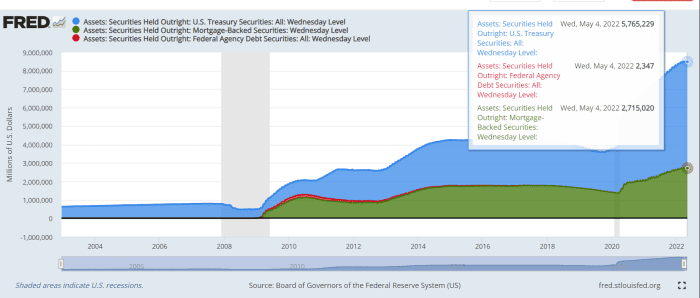This post was originally published on this site
Liquidity has been running in short supply in a pivotal corner of U.S. housing finance, as Wall Street braces for the Federal Reserve to dramatically tighten financial conditions.
Many investment banks now expect the Fed to raise its policy rates by 75 basis points on Wednesday, rather than the 50-basis-point increase telegraphed before May’s consumer-price index showed U.S. inflation has yet to ease from a 40-year high.
Read: A 75-basis-point hike? Here are 3 ways the Fed can sound more hawkish this week
Adding to market pressures, the Fed in June also began shrinking its near $9 trillion balance sheet, a key spigot of liquidity, by starting to reduce its record holdings (see chart) of Treasurys and agency mortgage-backed securities.

Federal Reserve looks to slash its roughly $2.7 trillion housing bond footprint
Board of Governors of the Federal Reserve System
The problem is that the massive $8.4 trillion agency mortgage-backed securities (MBS) market has begun showing signs of stress, even before the Fed begins to shrink, in earnest, its near 32% stake in the government-backed housing bond market.
“It’s a lot of selling, people raising cash,” says Scott Buchta, head of a fixed-income strategy at Brean Capital, by phone. “There have been three or four days of steady selling, ahead of the Fed decision.”
While market conditions haven’t gotten nearly as dire as in March 2020, before the Fed rolled out its bazooka of pandemic aid, Buchta said turbulence in the mortgage market could intensify this summer, unless other buyers step in to fill the void left by the Fed.
Individual investors often have exposure to the agency mortgage bond market through their fixed income holdings, but also from exchange-traded funds. The roughly $20.4 billion iShares MBS ETF
MBB,
was off 12.1% on the year through Tuesday, while the near $12.5 billion Vanguard Mortgage-Backed Securities ETF
VMBS,
shed 12.5%, according to FactSet.
Few corners of financial markets have been immune to losses this year, with the S&P 500 index
SPX,
down 21.6% so far, and officially in a bear market as of Monday.
While agency mortgage bonds often serve as a haven play, or Treasury
TMUBMUSD10Y,
bond surrogate, “primary” broker dealers at big investment banks have reduced their holdings by about 12% from a year ago, according to a Deutsche Bank research report on Tuesday, likely adding to liquidity woes.
“The Fed has owned such a significant portion of the MBS market for so long,” said Mark Fontanilla, founder of mortgage analytics firm Mark Fontanilla & Co. “Now, if they want to curb that, it’s a lot of paper for the market to absorb, not only from discontinued buying, but additionally from anything they would sell.”
Furthermore, the Fed’s retreat coincides with a tougher backdrop for the housing market. Home prices climbed about 20% in the past year, but the 30-year fixed mortgage rate has nearly doubled to around 5.2%.
“That’s a roughly 30% higher mortgage payment in itself,” Fontanilla said. “Not only do you have to have a larger down payment, but a 30% bigger mortgage payment certainly puts a dent in affordability.”
Also, as interest rates climb, the cost of leverage rises, a factor Buchta said will make it more expensive for buyers to step in and finance trades in the sector.

